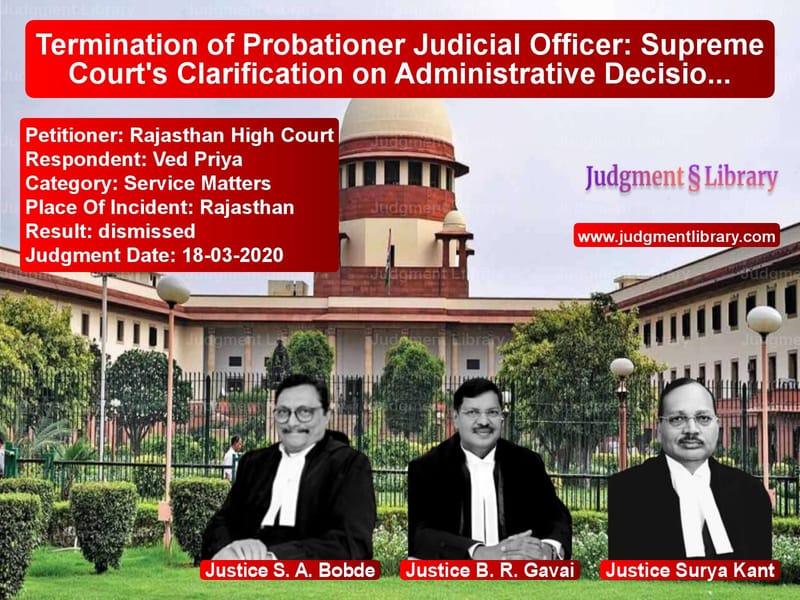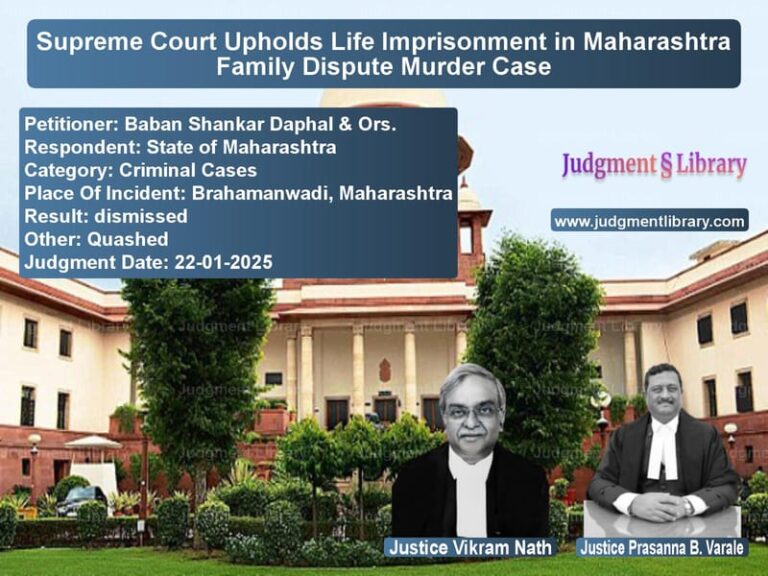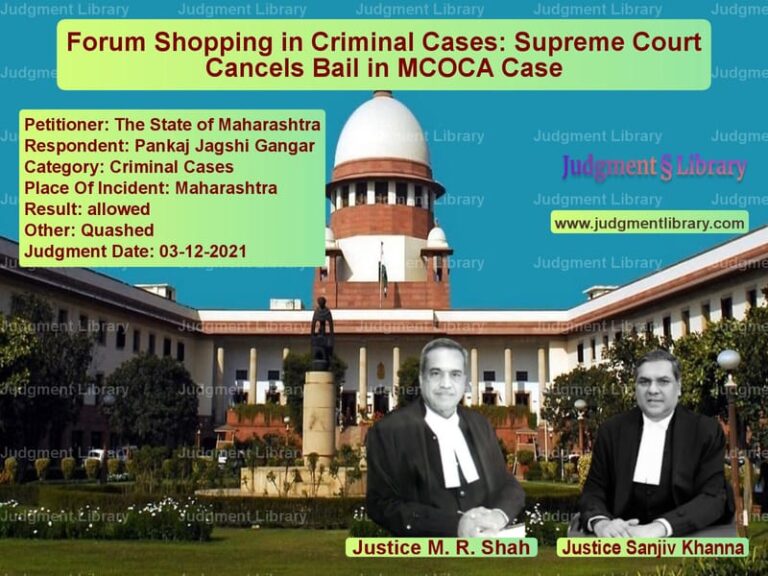Termination of Probationer Judicial Officer: Supreme Court’s Clarification on Administrative Decisions
The Supreme Court recently ruled on a significant case concerning the termination of a probationer judicial officer, Ved Priya, from the Rajasthan Judicial Services. The case, Rajasthan High Court v. Ved Priya & Anr., raised crucial questions about the powers of the High Court in reviewing administrative decisions regarding the confirmation of judicial officers during their probation period. This judgment delved into the principles of judicial review, the rights of probationary employees, and the legal procedures required for termination of services.
The issue at hand was whether the termination of Ved Priya’s services was arbitrary or unjust, and whether the High Court’s actions were consistent with constitutional principles, particularly those enshrined in Articles 14 and 311 of the Constitution. Ved Priya, a probationer, had his services terminated after an evaluation of his performance during his probationary period. The case provides valuable insights into the due process requirements when terminating a probationary employee, especially within the judiciary.
Background of the Case
Ved Priya was recruited into the Rajasthan Judicial Services on July 16, 2002, and was appointed as a Civil Judge (Junior Division)-cum-Judicial Magistrate. He was placed on probation for a period of two years, which was extended by two months. During his probation period, allegations of misconduct and corruption were raised against him. These allegations were based on his performance and judicial decisions, leading to the Rajasthan High Court’s administrative committee reviewing his suitability for confirmation.
After a thorough evaluation, the committee recommended not to confirm his services, and on September 16, 2004, the Full Court of the High Court concurred with this recommendation. Subsequently, the State Government issued an order on September 30, 2004, to terminate Ved Priya’s services. Ved Priya, aggrieved by this decision, filed a writ petition in the Rajasthan High Court, challenging the termination order. He argued that the order was punitive in nature, without a proper inquiry, and thus violated his rights to natural justice.
Petitioner’s Arguments
The Rajasthan High Court (appellant) raised the following arguments in support of the termination decision:
- The decision to terminate Ved Priya was based on a thorough review of his performance during probation, including his misconduct and failure to adhere to judicial standards.
- The termination was a part of the routine administrative process of evaluating probationers, and it was within the discretion of the High Court to decide on confirmation or termination based on the officer’s suitability.
- Allegations against Ved Priya, including issues related to his handling of cases under the Narcotic Drugs and Psychotropic Substances (NDPS) Act, were substantial enough to question his suitability for permanent appointment.
- The High Court’s decision to terminate his services was not arbitrary, and the judicial side of the High Court had no jurisdiction to intervene in administrative matters of the Full Court.
Respondent’s Arguments
Ved Priya (respondent) contended that:
- His termination was arbitrary and unjust, as no opportunity of hearing was given to him, and the allegations against him were not substantiated by any concrete evidence.
- The termination order was punitive, as it was based on unproven allegations of corruption and misconduct, which had not been proven through a formal inquiry or hearing.
- He had received positive feedback during his probation period, including good reports from his reporting authority, which should have been taken into consideration before deciding on his termination.
- Termination of services without a proper inquiry or hearing violates the principles of natural justice, which form the core of fair treatment under the law.
Supreme Court’s Ruling
The Supreme Court analyzed the case from various angles, focusing on the due process of law and the principles of judicial review. The Court held that:
“Although probationers do not enjoy the same constitutional protections as confirmed employees, they cannot be terminated arbitrarily without being given a reasonable opportunity to be heard.”
The Court also emphasized the importance of a probationer’s right to a fair evaluation and the requirement for transparency in the process. It observed:
- The termination order, while not explicitly punitive, must not carry a stigmatic implication that could affect the future prospects of the probationer. The lack of an inquiry into the allegations against Ved Priya made the termination procedurally flawed.
- Even though probationers are not entitled to the protections under Article 311, the decision to terminate must not be based on vague or unsubstantiated allegations. In this case, the Full Court had failed to provide any concrete evidence to justify the termination.
- The Court found that there was no formal inquiry or a chance for Ved Priya to defend himself against the allegations before his services were terminated, which violated the principles of natural justice.
Legal Precedents Referenced
The Court referred to several key judgments to support its reasoning:
- Kazia Mohammed Muzzammil v. State of Karnataka (2010) 8 SCC 155: The Court highlighted that the primary purpose of probation is to assess the suitability of a candidate based on actual performance, and not just on objective criteria.
- Shamsher Singh v. State of Punjab (1974) 2 SCC 831: The Court reiterated that a probationer cannot be terminated on the basis of allegations without a proper inquiry or hearing, especially when the termination could carry a stigma.
- Parshotam Lal Dhingra v. Union of India (1958) AIR 1958 SC 36: The Court relied on the principles outlined in this Constitution Bench decision to clarify when a termination order is punitive and when it is not.
Conclusion
The Supreme Court concluded that the Rajasthan High Court’s termination order against Ved Priya was flawed due to the lack of a proper inquiry and hearing. While probationers do not have the same rights as confirmed employees, the Court emphasized that they must still be afforded basic procedural safeguards, including the right to be heard and to defend against unsubstantiated allegations.
The Court set aside the decision of the Rajasthan High Court and directed the reinstatement of Ved Priya with consequential benefits, thereby reaffirming the importance of fairness and transparency in the judicial process, even during the probationary period.
Petitioner Name: Rajasthan High Court.Respondent Name: Ved Priya.Judgment By: Justice S. A. Bobde, Justice B. R. Gavai, Justice Surya Kant.Place Of Incident: Rajasthan.Judgment Date: 18-03-2020.
Don’t miss out on the full details! Download the complete judgment in PDF format below and gain valuable insights instantly!
Download Judgment: Rajasthan High Court vs Ved Priya Supreme Court of India Judgment Dated 18-03-2020.pdf
Direct Downlaod Judgment: Direct downlaod this Judgment
See all petitions in Employment Disputes
See all petitions in Public Sector Employees
See all petitions in Termination Cases
See all petitions in Judgment by S. A. Bobde
See all petitions in Judgment by B R Gavai
See all petitions in Judgment by Surya Kant
See all petitions in dismissed
See all petitions in supreme court of India judgments March 2020
See all petitions in 2020 judgments
See all posts in Service Matters Category
See all allowed petitions in Service Matters Category
See all Dismissed petitions in Service Matters Category
See all partially allowed petitions in Service Matters Category







